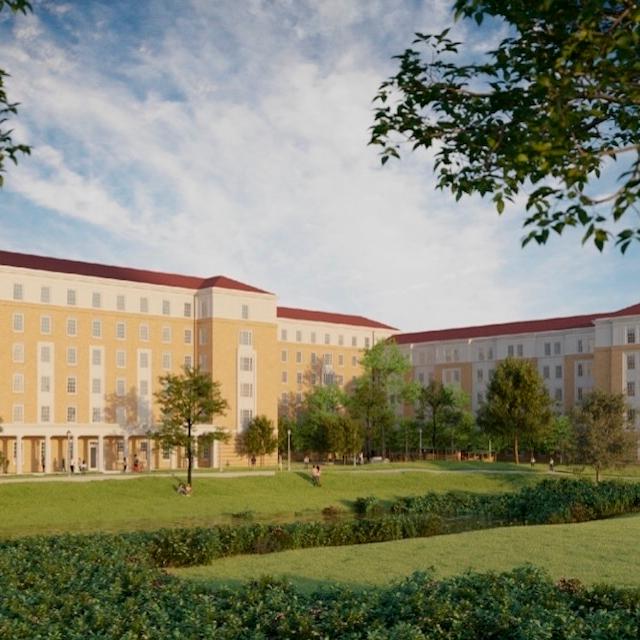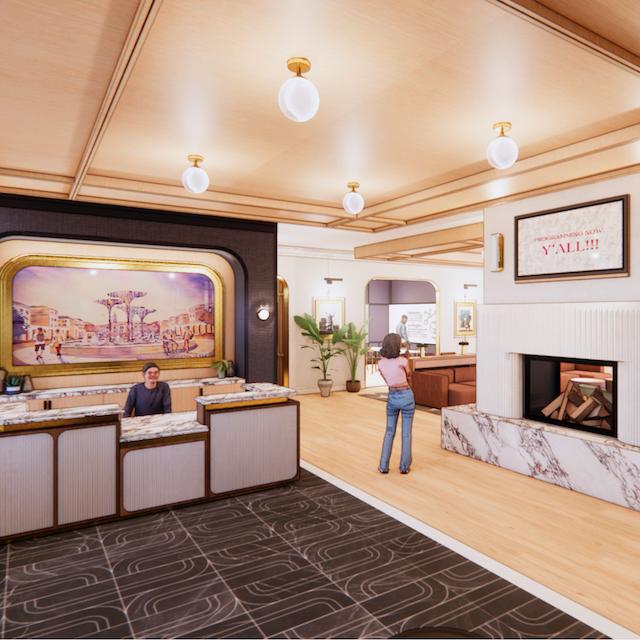
Connected Campus: TCU to be Home Sweet Home to More Students
There is, truly, no place like home. Housing & Residence Life wants first- and second-year
Horned Frogs to call campus home, even if just for a couple of years. And with six
more residence halls under construction, TCU is making a major investment in building
its on-campus community.
A dorm at TCU is much more than a place to sleep, study and socialize. It’s where
students connect, engage and build community, according to Rachel Anne Hopper, director
of Housing & Residence Life.
“As students build community and take ownership of it, they become more engaged and
empowered,” she said.
On-campus housing has also proven to increase retention, GPAs and graduation rates,
one of the many reasons TCU is invested in its two-year living requirement for most
students. In 2027, the university plans to open a 550-bed hall in Worth Hills and,
on the east side of campus, three first-year halls totaling 1,350-beds, a 450-bed
hall for sophomores and a 120-bed townhome and apartment community for upperclassmen.
Over the years, the Housing & Residence staff has refined best practices and ways
for students to build community, starting with creating comfortable and safe spaces
along with opportunities to engage.
“There are multiple connecting points when students live on campus that build community
and promote student-centered growth, one of TCU’s core pillars,” Hopper said. “They’re
also learning life lessons, like being a good neighbor and taking on responsibilities,
as well as learning to appreciate others’ perspectives.”
Senior Carter Moore, who now lives off campus, sees in hindsight how those on-campus
experiences helped her build relationships.
“The activities that TCU residence life (resident assistants and hall directors) planned
for us brought residents together in an amazing community,” she said. “From this experience,
I learned how important it was to surround myself with a community of people who will
have your back through the ups and downs of college.”
Many of those experiences are shaped through Housing & Residence Life’s KCE – Knowing,
Connecting and Empowering – model, Hopper said.
“We create a welcoming and inclusive environment, where students form connections
and a strong sense of belonging,” she added. That connection begins day one for first-year
students who are in a “season of unknowns.”
“Our staff is very systematic and intentional when we welcome them to campus,” she
said. “It’s a new home and environment for them, but we mean it when we tell them
and their parents that we’re going to take care of them. It’s adulting with a safety
net.”
Alex Dam, a senior and RA, said he strives to make the campus feel like home while
making a memorable college experience.
“I draw from my internship with the Department of Justice, which strengthened my leadership
and communication skills, to guide students through challenges, foster inclusion and
help them thrive academically, socially and personally,” he said.
TCU’s residence halls – the nation’s sixth best (on the campus that’s No. 1 for Happiest
Students, No. 2 for Best Quality of Life and No. 3 for Best-Run Colleges), according
to the most recent rankings by The Princeton Review – are a critical part of TCU’s Campus Master Plan.  The new facilities are designed meticulously. Most of the rooms for first-year students
will be double-occupancy so they can learn to live with others. There will be pod-style
bathrooms, common area lounges, community kitchens and laundry rooms near the activity
spaces.
The new facilities are designed meticulously. Most of the rooms for first-year students
will be double-occupancy so they can learn to live with others. There will be pod-style
bathrooms, common area lounges, community kitchens and laundry rooms near the activity
spaces.
“Because they’ll be larger buildings, it’s important to have larger and comfortable
meeting spaces that provide a social dynamic, especially for first-year students,”
Hopper said. “These lounges will be where we host get-to-know-you opportunities.”
Sophomore living will offer private bedroom suites with kitchenettes and outdoor firepits,
along with smaller lounge space, more study zones, community kitchens and laundry
rooms.
“These spaces will be more apartment-like to help these students in their transition
to off-campus life and community,” Hopper said. “By their junior and senior years,
they will have more life skills.”
The new upperclassmen facility will be a townhome and apartment community in private
two- and four-bedroom configurations with en suite baths. There will also be on-site
surface parking and limited private garages. Another new planned development, Morado
on Berry, near the southern edge of campus, will feature 780 luxury apartment-style
beds for upper-division and graduate students.
“What’s most exciting is that we have the opportunity to care for many more students within our residential
experience,” Hopper said. “As residential growth happens, we will be ready to care
for them, create moments for them to feel connected and empower them to do great things.”
